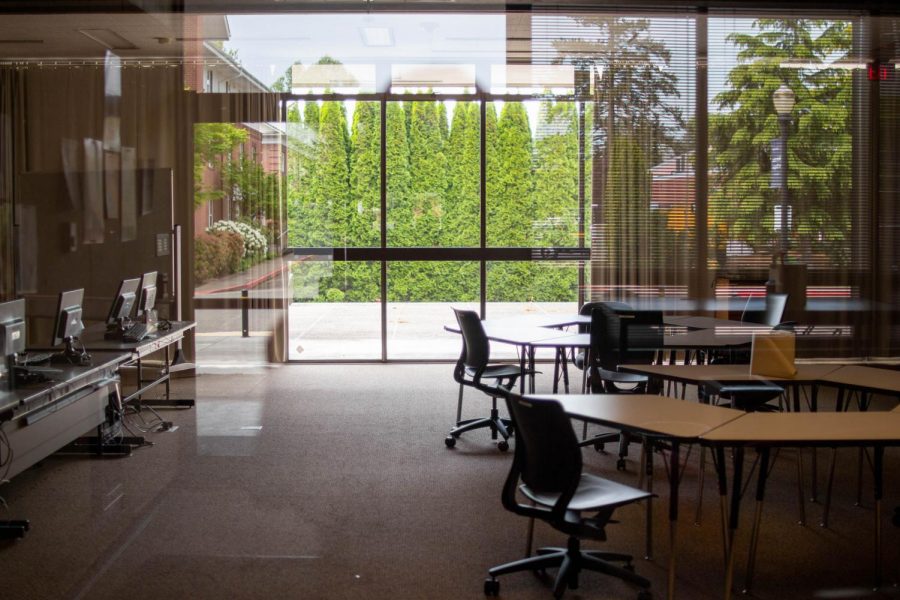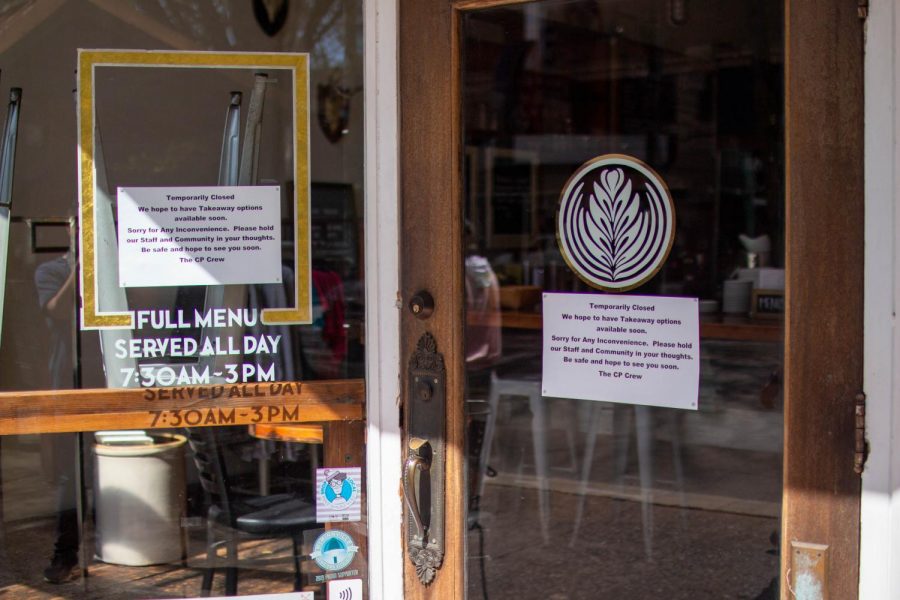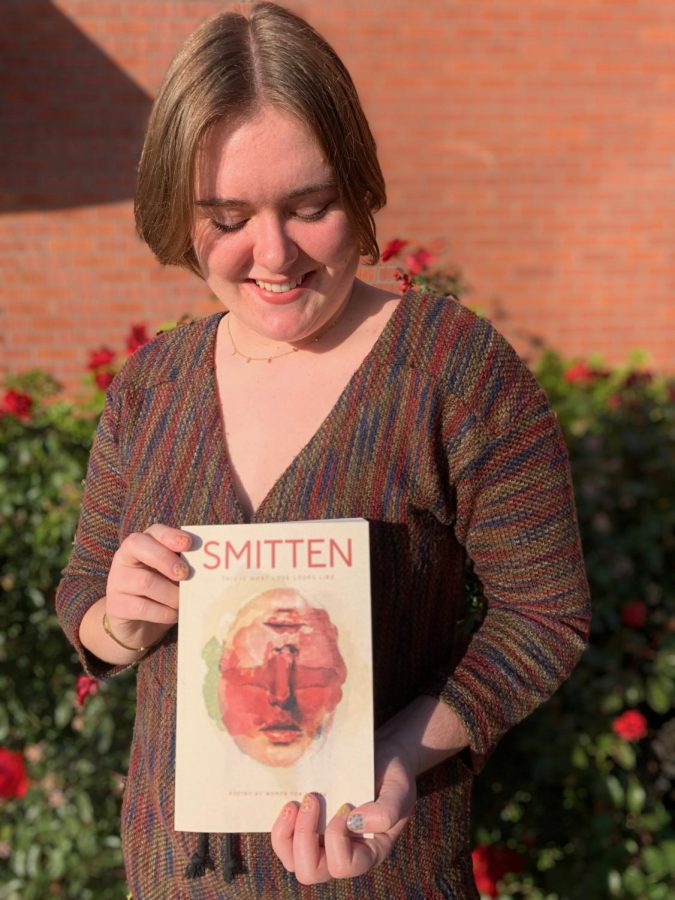“There are so many good memories here,” said Professor of Religious Studies William Apel, who will retire in June after working at Linfield for 36 years. “Gratitude is what I feel most — to be a part of it all.”
Apel’s passion for teaching and social justice has been felt throughout the college since his arrival in March 1975, when he took up positions as professor and college chaplain.
“My ideal job or position that I wanted would be to be a college or a university chaplain who also was on the faculty. That was exactly what Linfield was looking for at the time,” he said about what drew him to Linfield.
Before coming to Oregon, Apel taught while a graduate student of the history and literature of religions at Northwestern University’s Garrett-Evangelical Theological Seminary in Evanston, Ill. He said he also worked as the minister of Methodist Church in Glencoe, Ill., and was the assistant boy’s program director at the Evanston YMCA in Evanston, Ill.
Becoming a ’’Cat
The 64-year old professor said there were barely 1,000 students enrolled when he started at Linfield, and McMinnville had a population of just 10,000. He and his wife had never been to the Northwest before.
“It was kind of an adventure for us,” Apel said. “We had said to one another, if we go that far, we need to be prepared to stay for five years, which seemed like a long time for us then. The school just kept getting better and better, so we would just mentally re-sign up every five years.”
Apel worked as a professor and chaplain until 1995, when he ended his chaplaincy here to concentrate on teaching.
“It really was like a second birth for me,” he said. “Teaching set me free a little bit more to do some of the writing I wanted to do.”
As chaplain, Apel said he was on call 24 hours a day and helped counsel students, faculty and staff.
“It was always exciting and challenging because as a chaplain, you’re dealing with students and faculty and staff and the institution in terms of ethical issues,” he said. “When you’re a professor you need to have a little bit more distance, not being distant from the student, but you can’t get involved with issues in the same way.”
Over the years, though, Apel has developed a powerful teaching philosophy.
“I look a teaching as opening windows for students, and I try to open windows that I think will be interesting and important for students to look through,” he said. “But then the student has to look.”
During January terms, Apel has taught a class called “Monks and Mystics” at Our Lady of Guadalupe Trappist Abbey near Lafayette, Ore. The class has been one of Apel’s favorites to teach because it uses experiential learning to contemplate monastic life.
He said he also enjoyed teaching a seminar about the Holocaust and Dietrich Bonhoeffer, a German, Lutheran theologian who strongly opposed Nazism and Adolf Hitler.
“I’m not so much a philosopher or a systematic theologian but more of a historical theologian,” Apel said. “My area that I work in and my discipline is what I would call a narrative theology or working with spiritual biographies, so I’ve always been interested in people.”
Peace and justice
Apel’s work has gone far beyond teaching and mentoring; he strives to foster interest and involvement in peace and social justice issues.
He was key in the founding of Linfield’s Oregon Nobel Laureate Symposium — one of five such symposia in the world. He has helped bring such noteworthy individuals to campus as author Elie Wiesel and former President Jimmy Carter. Apel said allowing students to meet such significant people is one of his favorite memories.
Apel has advocated for women in the ministry, and he’s stood in support of gays and lesbians in church leadership.
Apel was also fundamental in divesting some of Linfield’s business interests in South Africa during the time of apartheid.
“I was sort of in the leadership with some of the student to, after two years, get the college to divest as a sign of solidarity,” he said. “We were able to divest before South Africa, under Nelson Mandela, became a new nation.”
Apel, who is ordained in the United Methodist Church and recognized by the American Baptist Churches, USA, is a member of the International Bonhoeffer Society. He was named a 2007-08 Shannon Fellow of the International Thomas Merton Society and received the Louise Hunderuup Religious Education Award in 2008. He also launched Linfield’s Habitat for Humanity Chapter in 1988.
Apel has lectured across the United States as well as in South Africa, England, Germany and Canada and said he has attended “meetings related to peace-making in Britain, Italy, Sweden, Russia and South Africa.”
“It is amazing what can be accomplished when supported by an institution like Linfield and having the freedom to serve outside the school as well as focus on teaching on campus, researching and writing,” he said. “The key to all this is freedom and trust — two values I hope Linfield will carry into the future and place even more at the center of its work.”
The ‘‘quiet things’’’
Despite these legacies, Apel said his primary accomplishments are “the more quiet things.”
“I think the main achievements are those little things that happen day to day with students, primarily sitting and talking to a student outside of class,” he said. “I’ve helped to create a better climate in which people can learn and a climate in which people are more inclusive of one another and open to one another.”
And his students aren’t the only ones doing the learning. Teaching has been a two-way street for Apel.
“It’s taught me humility in the sense that the professor is not the person who stands in front of everybody as the authority or the font of all knowledge. It’s a cooperative kind of venture,” he said. “I learned a lot about what it means to be a friend. It’s something that we sometimes take for granted, but relationships — that’s what’s most important to me in teaching. The subject matter is very important, but it’s what one learns in terms of relationships.”
Apel said he’ll miss friendships he’s made with students, faculty and staff at Linfield.
An open future
Although he “has no grand plan” for life after Linfield, Apel said he wants to spend time with family, write and teach voluntarily at colleges and universities.
“People who have retired tell me you shouldn’t make plans too quickly because then you get yourself tied up in too many things,” he said. “I want to balance my life in terms of work and relaxation and travel.”
Apel said that if he could leave a message for Linfield’s faculty and staff, it would be to “appreciate one another.”
“It’s amazing, our faculty and staff, and every person has their own story,” he said, “Stop and take the time to really appreciate one another. Learn each other’s stories.”
And to students, he sends hopes of perseverance.
“Work each in your own way for a more just and peaceful world,” Apel said, adding a paraphrased saying by Mother Theresa to characterize his message: “We cannot do great things, but we can do little things with great love.”
by Kelley Hungerford/Editor-in-chief
Kelley Hungerford can be reached at [email protected].







